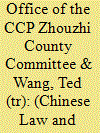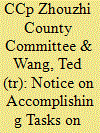| Srl | Item |
| 1 |
ID:
163744


|
|
|
|
|
| Summary/Abstract |
The Constitution of Kenya 2010 introduced a framework for devolving public resources in Kenya’s forty-seven Counties. The Counties were given the responsibilities of maintaining health, roads and agriculture, among others. Using the Afrobarometer (2015) survey, we employ probit regression to examine the determinants of successful public participation in the Counties. We find that approval of the Governor’s performance has a positive and significant influence on public participation. However, difficulty among the citizenry in influencing County decision-making; lack of responsive County Assembly Members; difficulty in accessing information on County budgets, legislation and projects; and corruption in the Governor’s office have a negative significance.
|
|
|
|
|
|
|
|
|
|
|
|
|
|
|
|
| 2 |
ID:
084267


|
|
|
| 3 |
ID:
197445


|
|
|
|
|
| Summary/Abstract |
Collaboration between local governments and businesses for poverty reduction has not yet been fully explored in China. Based on an in-depth investigation of two counties during the Targeted Poverty Alleviation campaign, this study proposes a multilayered and relational approach to understanding how different levels of officials collaborate with business to reduce poverty. Elite bureaucrats at the county and township levels prefer a growth-oriented strategy for attracting large-scale enterprises to make investment. Their coalition with businesses has created profits and employment but also hindered authentic participation of small- and medium-sized businesses and villagers in their selected villages. In contrast, in villages that were not prioritized by elite bureaucrats, local officials could utilize their discretion and indigenous resources to exploit development opportunities and support small- and medium-sized businesses to reach poor villagers. This study unpacks China's multilevel system to understand the various forms of government–business collaboration and their implications for rural poverty reduction.
|
|
|
|
|
|
|
|
|
|
|
|
|
|
|
|
| 4 |
ID:
084273


|
|
|
| 5 |
ID:
163330


|
|
|
|
|
| Summary/Abstract |
In the early 1990s, China opened its urban water sector to private investors to secure the country's growing urban water demand. In Chinese counties which accommodated around 195 million urban population in 2012, private sector participation (PSP) has progressed slowly but steadily among the county-level water utilities. Using a panel data set extracted from the annual surveys conducted by the National Bureau of Statistics of China (1998–2006), we exploit the changes in the PSP status of water utilities and apply a fixed-effects model to identify the causal effects of PSP on 12 performance indicators. We find that utilities with private investment enjoyed significant performance improvement in three areas: output, financial performance and profitability, and efficiency. Using supplementary data from population censuses and statistical yearbooks, we find that water quality is slightly lowered under PSP, while no significant effect is detected for the other service outcomes. The findings suggest that a greater role of PSP in the urban water supply sector of Chinese counties could be promoted.
|
|
|
|
|
|
|
|
|
|
|
|
|
|
|
|